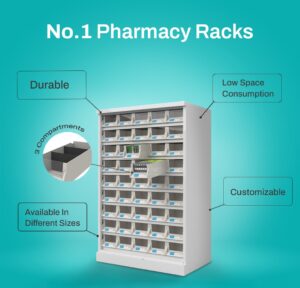Proper pharmacy storage is crucial for maintaining medicine efficacy, ensuring operational efficiency, and complying with regulatory requirements. A well-organized pharmacy prevents expired medications, misplaced stock, and legal penalties while enhancing customer trust. However, mismanagement of pharmacy storage can lead to significant risks, including dispensing errors, financial losses, and regulatory non-compliance.
This guide covers the most common pharmacy storage mistakes and expert solutions to create a well-organized system that promotes safety and efficiency.
Common Pharmacy Storage Mistakes & Solutions
1. Storing Medicines at Incorrect Temperatures
Mistake:
-
- Some medicines require refrigeration, while others need dry, room-temperature conditions. Improper storage can degrade potency and effectiveness.
-
- Pharmacies often fail to monitor temperature-sensitive medicines correctly, leading to compromised medication safety.
Solution:
-
- Use temperature-controlled pharmacy racks and specialized storage cabinets to maintain optimal conditions.
-
- Install thermometers and automated monitoring systems to track temperature fluctuations in real time.
-
- Examples of temperature-sensitive medicines:
-
- Refrigeration Required: Vaccines, insulin, biologics.
-
- Dry Storage Required: Tablets, capsules, dry syrups.
-
- Examples of temperature-sensitive medicines:
-
- Implement a backup power system for refrigerators to prevent spoilage during power outages.
2. Poor Medicine Categorization & Labeling
Mistake:
-
- Mixing different drug categories can lead to confusion and increase the risk of dispensing errors.
-
- Unclear or missing labels make it difficult for pharmacists to locate and identify medications quickly.
Solution:
-
- Organize medicines by type, category, and usage (e.g., antibiotics, pain relievers, OTC drugs, and controlled substances).
-
- Use clear, color-coded labels for quick identification of medication groups.
-
- Implement an automated inventory management system with barcode scanning to streamline medication tracking and reduce errors.
-
- Store high-risk medications separately from general stock to avoid accidental misplacement.
3. Ignoring FIFO (First In, First Out) Inventory System
Mistake:
-
- New stock is often placed at the front, causing older medications to remain unused, leading to expiration and waste.
-
- Expired medications can result in health risks for patients and regulatory penalties for the pharmacy.
Solution:
-
- Implement a FIFO (First In, First Out) system where older stock is placed at the front and used first.
-
- Conduct regular stock audits to check for expired or soon-to-expire medicines.
-
- Use rotating storage shelves or gravity-feed racks that allow easy access to older stock.
-
- Train pharmacy staff on proper stock rotation procedures.
4. Lack of Secure Storage for Controlled Substances
Mistake:
-
- High-risk medicines (such as opioids, sedatives, and controlled drugs) stored in open-access areas increase the risk of theft, misuse, and legal violations.
Solution:
-
- Store controlled substances in lockable pharmacy cabinets with restricted access.
-
- Maintain digital records of access logs to track inventory and prevent unauthorized access.
-
- Implement two-step verification for dispensing high-risk medicines.
-
- Conduct periodic audits to ensure that controlled substances are properly accounted for.
5. Overcrowding & Inefficient Space Utilization
Mistake:
-
- Limited space and cluttered shelves make it difficult to find medicines quickly.
-
- Poor organization can lead to stock misplacement and financial loss.
Solution:
-
- Use modular pharmacy storage solutions designed for maximum space efficiency.
-
- Install adjustable shelving systems that can be customized for different medication sizes and types.
-
- Regularly declutter and remove excess or obsolete inventory.
-
- Implement an optimized bin system with clear labeling to separate different drug categories.
6. Ignoring Pharmacy Storage Compliance Regulations
Mistake:
-
- Failure to follow Good Storage Practices (GSP) and national/state pharmacy regulations can result in fines, legal penalties, and loss of pharmacy licenses.
Solution:
-
- Adhere to Good Storage Practices (GSP) as mandated by the National Pharmacy Board.
-
- Keep records of temperature logs, expiry dates, and stock levels for auditing purposes.
-
- Conduct regular compliance audits to identify and correct storage deficiencies.
-
- Train staff on regulatory requirements to ensure continuous adherence.
Benefits of an Organized Pharmacy Storage System
-
- Improved Operational Efficiency
-
- Faster medicine retrieval, reducing customer wait time.
-
- Minimized dispensing errors, leading to safer prescriptions.
-
- Improved Operational Efficiency
-
- Better Regulatory Compliance
-
- Adheres to Good Storage Practices (GSP) and prevents legal risks.
-
- Ensures secure storage of controlled substances and high-risk medications.
-
- Better Regulatory Compliance
-
- Enhanced Medicine Safety
-
- Reduces the risk of dispensing expired or incorrectly stored drugs.
-
- Protects medicine potency through proper temperature and humidity control.
-
- Enhanced Medicine Safety
-
- Optimized Inventory Management
-
- Prevents overstocking and minimizes financial loss due to expired stock.
-
- Enables easier stock tracking with automated systems.
-
- Optimized Inventory Management
-
- Higher Customer Trust & Satisfaction
-
- A well-organized pharmacy builds credibility and improves customer experience.
-
- Enhances patient safety by ensuring accurate dispensing.
-
- Higher Customer Trust & Satisfaction
Conclusion
Avoiding common pharmacy storage mistakes is essential for maintaining medicine safety, ensuring regulatory compliance, and improving operational efficiency. Investing in high-quality modular pharmacy storage systems can drastically enhance organization and workflow.
Allchemist provides customizable pharmacy storage solutions designed for optimal organization, security, and compliance. With expert-designed storage solutions, pharmacies can maintain efficiency, safety, and compliance effortlessly.
For expert pharmacy storage solutions, contact Allchemist today!
































